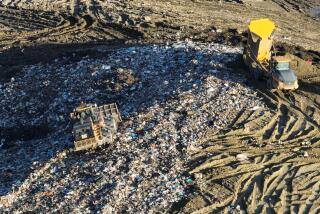City’s Recycling Program Exceeds State Requirements
LOS ALAMITOS — The city’s recycling program has succeeded in diverting more residential waste from landfills than state law requires, city officials said.
In a report Monday to the City Council, Assistant City Manager Gerard Goedhart said the city has surpassed the state requirement by more than 3%.
Under a law passed in 1989, cities are required to reduce the amount of waste dumped in landfills.
The statute requires cuts in solid waste disposal of 25% by 1995 and 50% by 2000. Violations carry fines as high as $10,000 per day until there is compliance.
Goedhart said that, compared to 1989, the city has diverted 28.2% of its residential waste away from landfills as a result of its recycling and trash reduction drive.
“Our residents have met the goal of 1995,” Goedhart said.
Compared to 1990-91, recycling tonnage increased by 3.5% in 1991-92 while recycling percentage was up 11.8%, Goedhart said, based on figures from Briggeman Disposal Co., the city’s trash hauler.
Total trash hauled, Goedhart said, was 3,327.6 tons in 1991-92, compared to 3,705.5 tons in 1990-91. In 1989, there were 4,600 tons.
However, residential waste makes up only 25% of the city’s total solid waste, Goedhart said. The bigger chunk is generated by commercial and industrial firms. State requirements for recycling this waste have not been met.
Goedhart said the commercial and industrial recycling and waste reduction program will be submitted to the council in January, with implementation to start in July.
So-called “green” waste recycling will also be implemented, starting with the collection of discarded Christmas trees on Dec. 30 and Jan. 6, Goedhart said. He said green waste accounts for 33% of total waste.
The city is looking for a facility that recycles green waste.
As an incentive to reduce waste, Goedhart said the city plans to reduce the size of trash containers from the current 100-gallon receptacles to smaller ones. He said rates could also be adjusted so that those generating bigger volumes of trash will have to pay more.
More to Read
Sign up for Essential California
The most important California stories and recommendations in your inbox every morning.
You may occasionally receive promotional content from the Los Angeles Times.









